
Donate to Innerviews
Since 1994, Innerviews has provided uncompromising, in-depth interviews with musicians across every genre imaginable. And it does that with no trackers, cookies, clickbait, or advertising.
Your donations are welcome to help continue its mission of highlighting incredible music and artists, without any commercial considerations.
Your contributions will be instantly transformed into stories and videos, and cover hosting and web management costs. Importantly, your dollars will help ensure Innerviews remains absolutely free to all visitors, independent of their ability to financially support it.
Please consider making a donation today by using the PayPal QR code below.

Skerik
Unpopular Music
by Anil Prasad
Copyright © 2024 Anil Prasad.
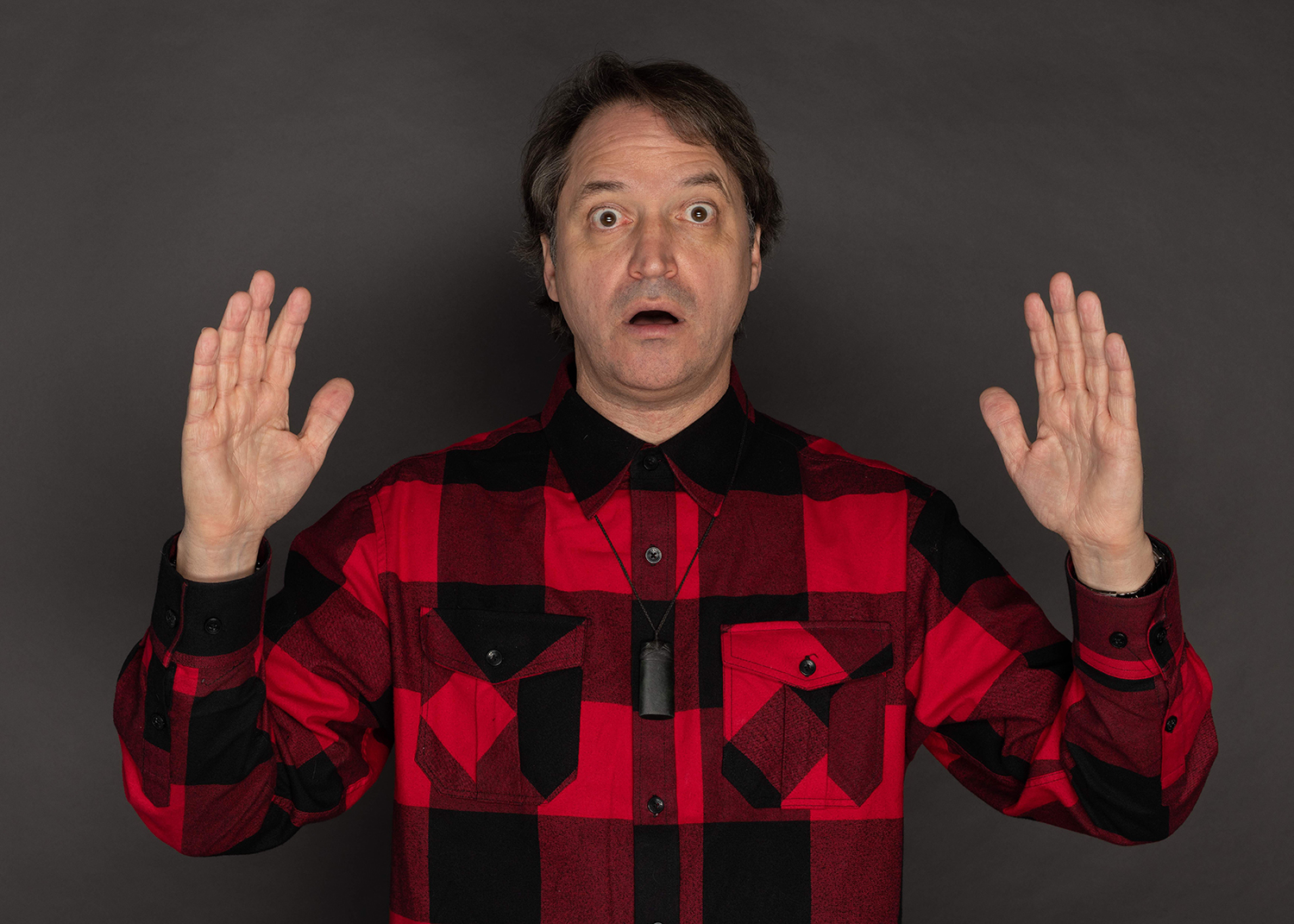 Photo: David McGraw
Photo: David McGraw
Skerik’s nomadic, endless appetite for creativity and collaboration has yielded one of most prolific bodies of cross-genre recordings of the last four decades. The saxophonist, keyboardist, composer, improviser, and bandleader has led or been a participant in countless ensembles since his career began in the early ‘90s.
Born Eric Walton, the Seattle native and resident has a reputation as an incendiary performer with wildly-entertaining stage antics that energize musicians and audience members alike. And even while he’s leaping around and interacting with everyone mercurially and sometimes humorously, the music is always performed with intent, contextual sensitivity, and daring.
The serial collaborator has performed and recorded with Scott Amendola, Wil Blades, Mike Clark, Les Claypool, Nels Cline, Galactic, The Headhunters, Kayo Dot, Khu.éex', The Meters, Bobby Previte, Sadhappy, Tuatara, Fred Wesley, and Zony Mash. He has also co-helmed many avant-rock and jazz-inspired groups, including Black Frames, Crack Sabbath, DRKWAV, Garage A Trois, McTuff, Ponga, and the Dead Kenny Gs. In addition, he has nine solo albums to his credit.
He's perhaps best known for his work with Critters Buggin, the Seattle-based quartet active between 1993-2023. Together with multi-instrumentalist John Bush, drummer Matt Chamberlain, percussionist and vibraphonist Mike Dillon, and the late bassist Brad Houser, the group scaled colossal musical heights across eight albums and gigs across the world. There was never any possibility of placing the group in a category. Critters Buggin crisscrossed genres including rock, industrial, funk, punk, jazz, and electronica, and even brought in global musical influences from Africa and South America.
In recent times, Skerik has been focused on trio configurations. His latest recording project is All That Syncs Must Diverge, the debut album by Sound Cipher, a band that also features drummer Tim Alexander and keyboardist and bassist Timm Mason. The group delivers a tidal wave of sound full of searing, processed sax, pounding rhythms, and synth sounds ranging from the skittering to the chunky to the ethereal. Much of it is urgent and aggressive, practically serving as a mirror of global civil unrest.
Another notable recent release Skerik was involved in is Garage A Trois’ Calm Down Cologne. The album reunites the original lineup of the group, including guitarist Charlie Hunter and drummer Stanton Moore. The adventurous instrumental unit first formed in 1999 and morphed across several lineups and recordings with Skerik and Moore as constants. In 2021, serendipity led the three original musicians to tour together again, ultimately yielding the recording and the intent to keep moving forward.
The third three-piece Skerik is currently working with is Lorbo, which put out its first record Lizard in 2020. The band, which also includes vocalist Brad Mowen and drummer Lupe Flores, combines dark metal, hard rock, and ambient elements, along with a significant dose of theatrics. It often performs in horror movie-style costumes to enthralling effect.
In the midst of Skerik’s endless activity, he was hit with a major injury in April 2023 which forced him off the road and paused all recording activity. It affected his shoulder and neck so severely that he was unable to move. The financial impact was devastating, leaving him without an income. A GoFundMe was established by Amendola and Blades, and Skerik’s friends, fans, and family contributed significantly. As a result, Skerik obtained the right medical assistance to get him back on his feet and he’s now well on the road to recovery.
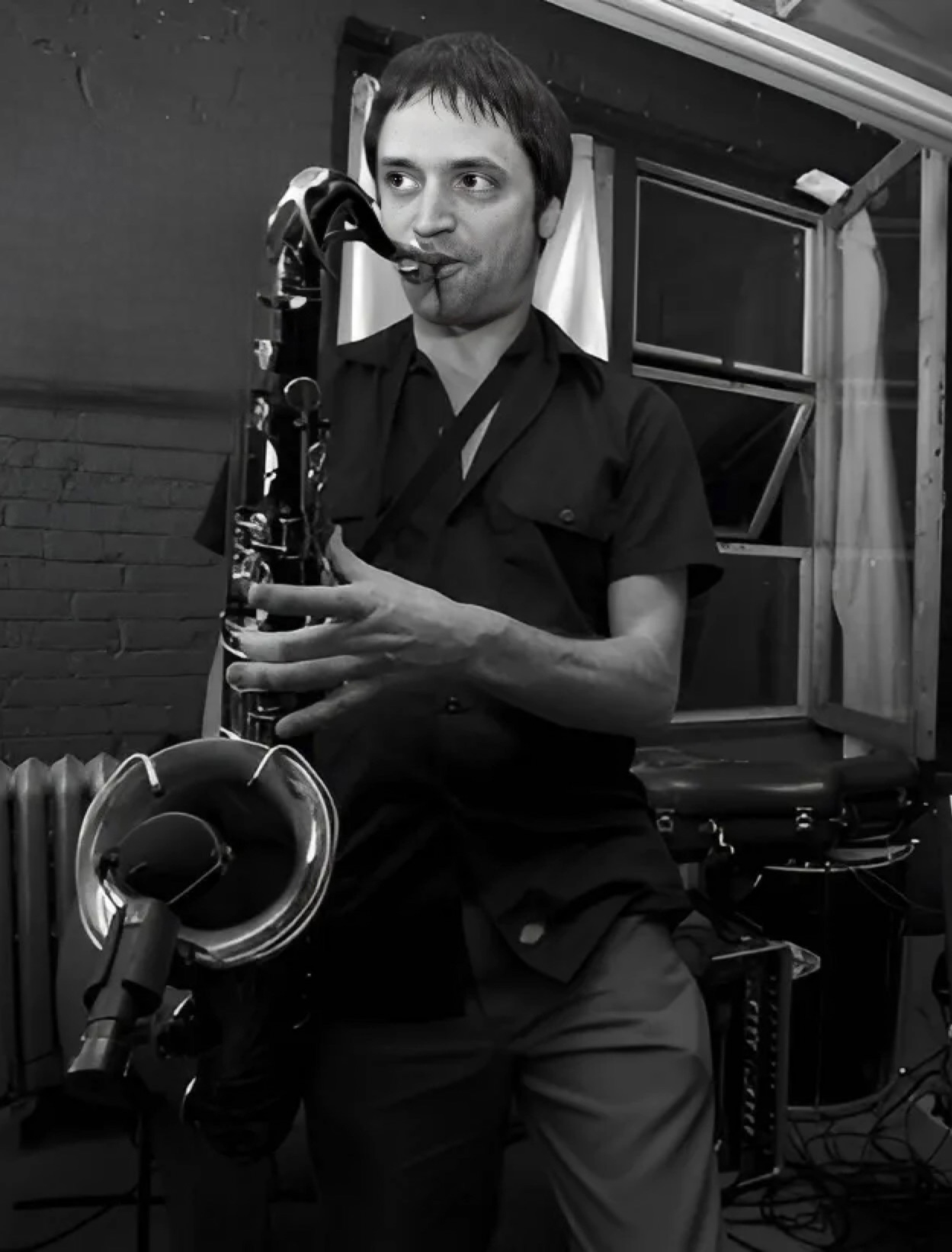 Photo: Michael Didonna
Photo: Michael Didonna
Describe the physical issues you experienced in 2023 and how your extended community responded to them.
I was on tour with Wil Blades, Scott Amendola, and Cyro Baptista. We were staying at Cyros’ house in New Jersey, and I was sleeping on a futon in his studio. I woke up one morning and everything was all crazy. I felt like my shoulder was all messed up. I had those guys work on my shoulder a little bit, but it didn’t really help. We played the gig that night at Nublu in Manhattan and had a good gig. But I was sore. The next morning, I woke up and couldn't move. It was really bad. I saw all kinds of people and did acupuncture, Rolfing, and medical massage, but nothing was helping.
I ended up missing the rest of the tour. I stayed at Cyros’ house and then got back to Seattle. I had to start cancelling all of the gigs I was supposed to have, including a residency at the Earshot Jazz Festival last October. I was also supposed to do a two-and-a-half-month tour with Les Claypool. I had to cancel that too. Eventually, I cancelled a year-and-a-half of gigs. I thought “Wow, this is crazy. What am I going to do to survive?”
Scott and Wil set up a GoFundMe for me and it was very moving. So many people were just incredibly supportive. People were calling me, writing me, and sharing their own personal health histories with these kinds of problems. They also sent me on some very interesting pathways to recovery—primarily the books of Dr. John Sarno which were very helpful. He’s an expert in the study of neuroplasty and psychophysiological pain. I also had an amazing physical therapist named Brian Feng, who really helped me, too.
I saw so many people that were all really helpful. It all combined into really helping the healing process. I was kind of immobile for over a month and my saxophone chops atrophied because I wasn’t playing. So, it was really hard. All I was doing was meditating and looking out the window. That was an amazing restart in my life because we’re always so busy in our lives. Most of us are just going all the time. I don’t think many people really have the opportunity in their lives to just stop. For me, everything literally stopped. All I had was my breath, some water, and some food.
Also, just being by myself, quiet, and thinking all day was valuable. I couldn’t read any books, consume any media, or listen to any music. So, no videos or movies or anything. It was as if it was all planned, like there was some guiding force saying “You’re not going to want to do any of this stuff. I want you to just meditate and be with yourself.” It was incredible in that respect. When I look back at it, I think of this period as a gift. It was a real opportunity. I discovered a lot of different things about life and what’s really important to me. And that has a lot to do with musical choices.
Being a side-person isn’t something I started out pursuing. Music has always been a 100% spiritual, creative, and fun endeavor for me. So, I think the universe and my inner soul needed to remind me of that and that’s why this thing happened. I’m kind of back on course now, musically, and it feels really good. I’m very lucky.
What did the support from fans, friends, and family on GoFundMe mean to you?
There’s your biological family, your extended family, and your musical family. All three of those entities came together and were a very powerful reminder of what’s good in the universe. That's always going on, but people don’t always know that. There are people out there waiting to help each other.
When something like this happens, you become a part of that very physically and very much in the present. Your accumulation of positivity and credit, or karma—whatever your belief systems tell you—can come together.
I had a lot of thoughts about it, and it reinforced the importance of just being good to people and looking out for them. It’s always been that way with me, and it will continue to be that way. I try to return it to people all the time. That’s for sure. It was such a powerful, emotional time for me. Everyone’s outpouring of support was incredible.
Sound Cipher makes extremely mercurial music. Talk about how the trio came together and its collective vision.
Tim Alexander and I were playing with Primus on the Willy Wonka and the Chocolate Factory tour in 2014. Tim had a 360-degree drumkit, with an acoustic percussion setup behind him. He could just spin around and play all these parts that the orchestration of this music accompanying the Willy Wonka themes required.
At soundcheck one day, I think it was at the Fox Theater in Oakland, we were just improvising. It was just me and him. After that, it was like, “Man, we should record sometime.” He was living in Bellingham, just north of Seattle where I am. He said “Yeah, let’s do it.”
So, we got together at Studio Litho in Seattle. I was the last to arrive. I walked in there and I had suggested to our producer Randall Dunn to have another friend of ours, Timm Mason, on the session. The idea was to have him bring his modular synth equipment in and be in the control room with Randall so he could do live processing of our sounds. Randall has used him on some DRKWAV mixing. It’s just amazing to have an extra person in the control room live processing. And then the mix engineer can bring it all together, so everything fits certain sections. They run automation and it’s really cool and fun. It’s also expensive. So, that’s the way I thought it was going to happen.
What actually happened is when I walked in the studio, Timm was in the play room setup, with his keyboards and modular gear. I was like “Okay, that changes everything. He’s going to be a contributor to the music, not just process the music we create. He’s going to be an equal creator.” So, Timm would send me clock information and crazy arpeggio stuff. I would voice it out on the keyboard at my little station. And we started improvising for hours and it was really fun. After we finished, we were like, “We could do this differently. We need to go back into the studio and record it again.”
When we went back, everything was much stronger. We had the initial improvisations, and all that chemistry was established. But the second recording session included the more strategic, intentional use of all three players. It’s really powerful music. I love how it really features Tim’s drumming. It’s like a crazy soundtrack for a bizarre movie. I really dig that group.
We also started doing some live shows, including a big one at the Laser Dome in the Pacific Science Center in Seattle. It was amazing to do with live lasers. We were also supposed to do a record release party last year, but it got cancelled because of my injury. So, we’re going to try and do the record release event this fall.
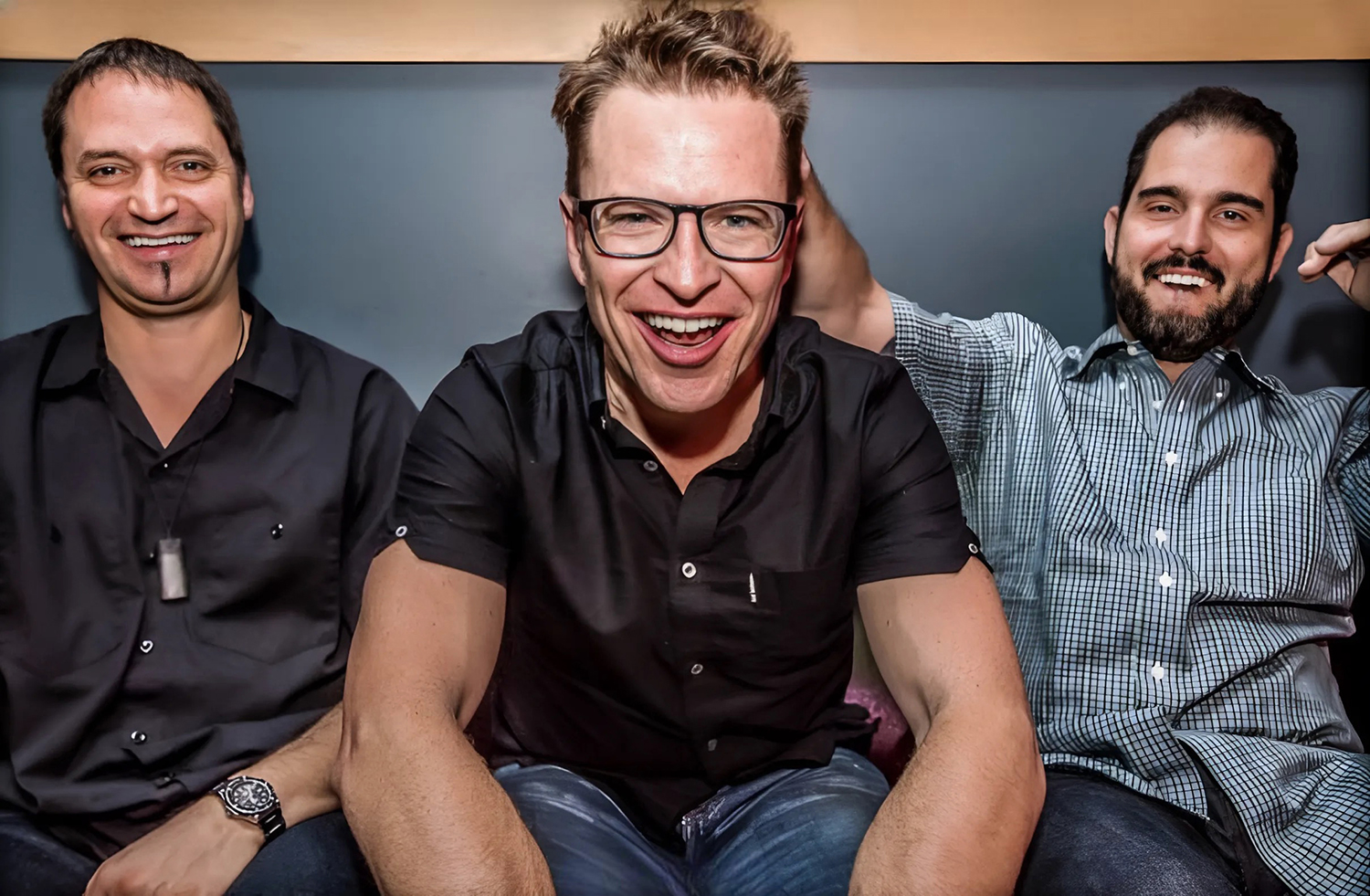 Garage A Trois, 2022: Skerik, Stanton Moore, and Charlie Hunter | Photo: J. Mimna
Garage A Trois, 2022: Skerik, Stanton Moore, and Charlie Hunter | Photo: J. Mimna
Garage A Trois reemerged as a trio in 2021. Discuss the group’s circular journey that led it to record Calm Down Cologne.
We started out as a trio. I first met Charlie Hunter in the studio in 1998. I met Stanton Moore initially in 1997 when recording for his first solo record. After the end of that recording session for Stanton, the producer said “Hey, keep recording. We’ll do another thing with just the three of you guys so you can have a trio record.” So, that became the Garage A Trois Mystery Funk EP. We then said, “Let’s do some gigs.” We played in New Orleans and did a West Coast tour.
Garage A Trois has been a thing off and on, ever since. But Charlie has such a prolific career with his own bands and performing with others. He was doing Garage A Trois a lot and one day, he’s like “Hey, I can’t do this anymore. I’ve got to do my own thing.” So, he left the band, and we got Marco Benevento. And by that time, Mike Dillon had been introduced the group and he joined. So, we started writing music together and it was a completely different sound with them—just really fun and amazing. John Medeski did a gig with us once, too. I didn’t even know he played bass and keyboards at the same time. He learned our material and it was incredible.
Going back to Marco, we did a few records with him, and then that band stopped playing for several years. The original trio then got back together, and we said, “Let’s do some shows.” One day, on the day of a show, we realized there was a recording studio across the street, and we thought “Let’s go and record” and that’s how Calm Down Cologne came about. It was just a blast. And that record’s done really well.
We did a bunch of shows in 2023 and we’ve recorded a new studio record that’s being mixed right now by Randall Dunn.
What makes the chemistry between you, Hunter, and Moore work so well?
I think we have a lot in common on the rhythmic side of music, especially when it comes to the soul jazz influence from the ‘60s and ‘70s. Charlie takes a lot of inspiration from the organists of the era when he plays bass and guitar at the same time. He’s playing in the tradition of those Hammond players. It’s a very specific vibe. Charlie’s also into Afro-Cuban music. And I had played a lot of African music when I lived in London and Paris. Stanton is also always studying all kinds of rhythmic permutations and drum stuff.
So, those are the sorts of things we’ve always focused on and explored. We have that in common. We’re also always asking ourselves, “Where’s the rhythm at? Why are we doing this? Where’s this placement happening? How are we doing this?” So, when we play together, it’s like a very intensive groove dissertation.
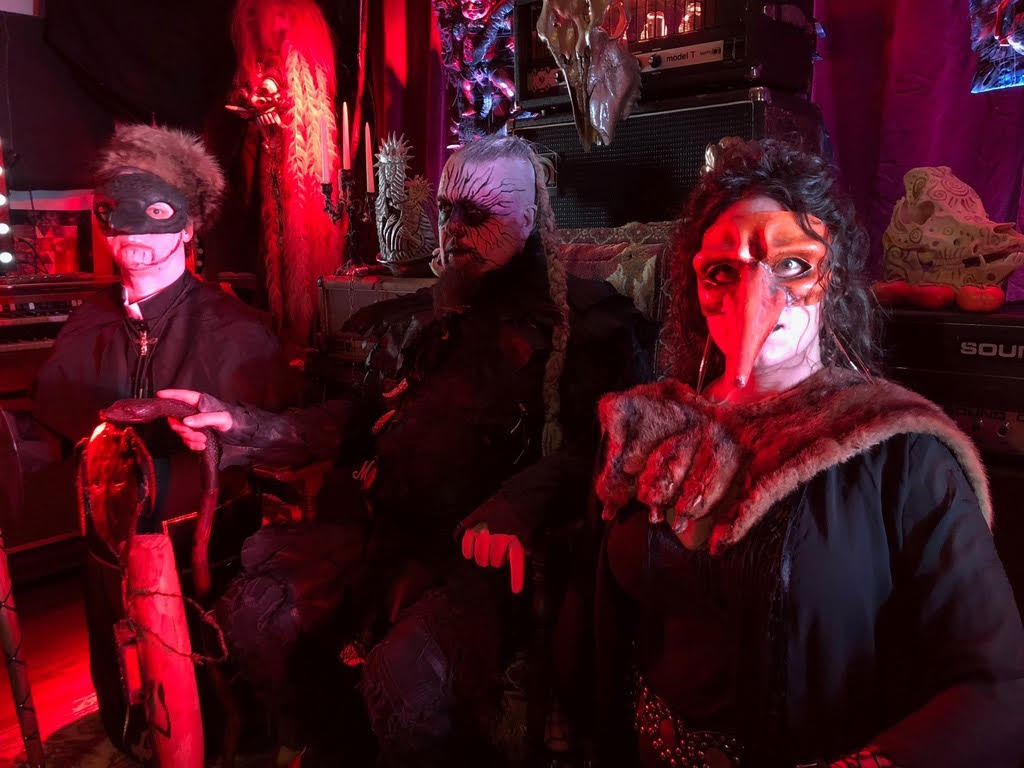 Lorbo, 2020: Skerik, Brad Mowen, and Lupe Flores | Photo: Carrie Robinson
Lorbo, 2020: Skerik, Brad Mowen, and Lupe Flores | Photo: Carrie Robinson
Lorbo’s Lizard is a giant swirl of influences, with punk jazz and black metal elements. Explore the band’s intent.
Heavy music has always been an important thing to me. I love it. I like 5% of everything when it comes to music. When Matt Chamberlain is asked “Tell me what kind of music you play,” he responds “We play our record collection.” That’s the same for me. I love everything—symphonic music, Bad Brains, Pharoah Sanders, Peter Brötzmann, and music from Thailand—literally everything from everywhere.
Critters Buggin had done some heavy stuff with distortion, but Lorbo really focuses on that. The best way I can contribute to that kind of music is by playing keyboards. So, I wrote all these tunes I could perform with them. I’m not a great keyboard player, so I play bass and the higher parts. I run it through this Marshall amp and through tube gear, and all kinds of other crazy stuff.
Brad Mowen is the singer from Burning Witch, as well as Cryptic Slaughter, so he does huge shows. He was also in Master Musicians of Bukkake. It’s great to work with him.
Lorbo is also a great outlet for the theatrical side of what we do. We like wearing crazy costumes when we play this intensely-heavy music. It’s super-Black Sabbath-like stuff with drone-y elements. Lupe Flores, the drummer, is just amazing, and perfect for the power of the music.
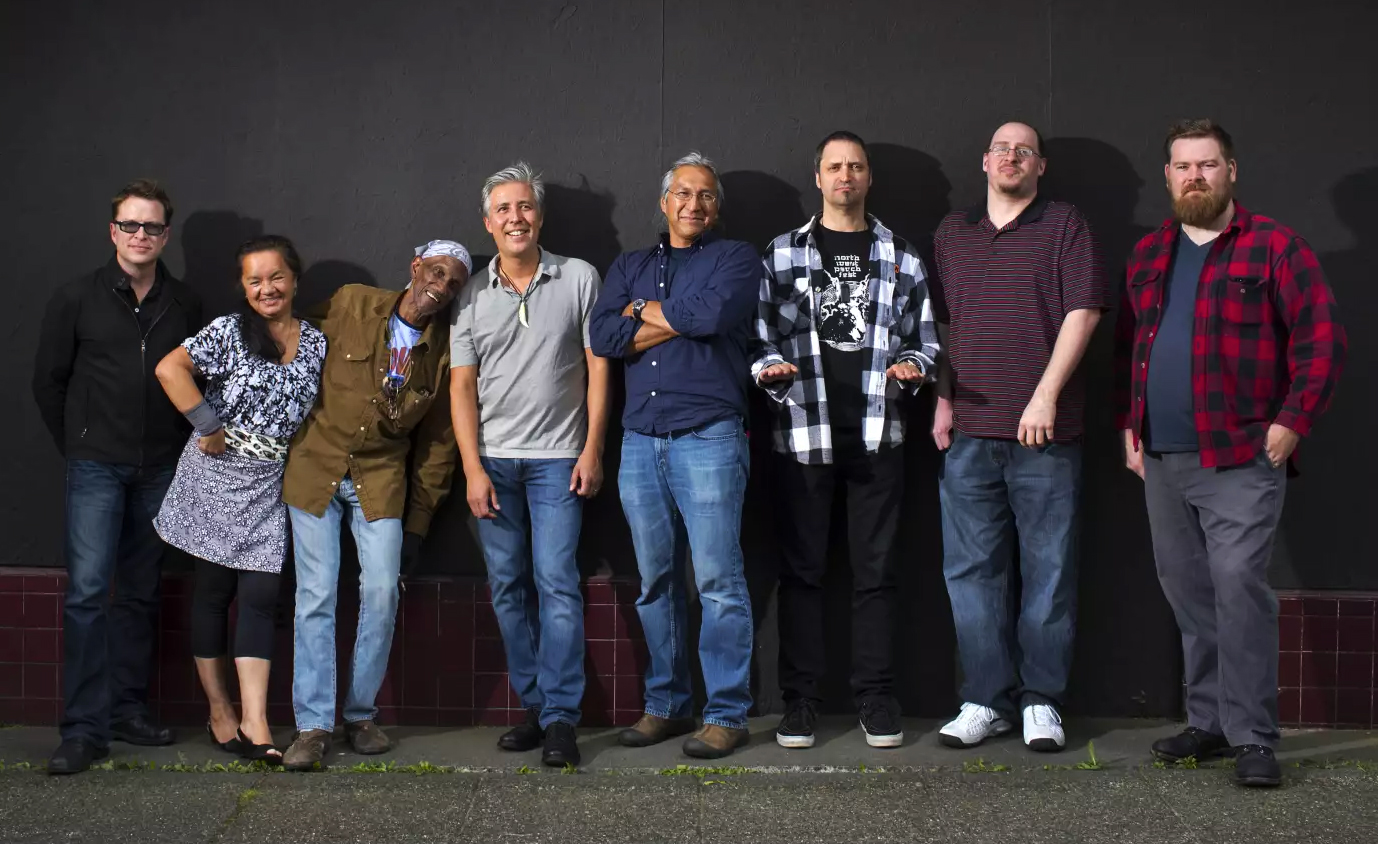 Khu.éex', 2014: Stanton Moore, Clarissa Rizal, Bernie Worrell, Preston Singletary, Gene Tagaban, Skerik, Captain Raab, and Randall Dunn | Photo: Russell Johnson
Khu.éex', 2014: Stanton Moore, Clarissa Rizal, Bernie Worrell, Preston Singletary, Gene Tagaban, Skerik, Captain Raab, and Randall Dunn | Photo: Russell Johnson
You’ve made four albums with Khu.éex' which feature Bernie Worrell. Discuss the group’s output and what it was like to work with Worrell.
That was another fortuitous situation because Bernie had moved to Bellingham, just like Tim Alexander did. He moved there from New Jersey with his wife Judy, and Preston Singletary, who is a well-known glass artist, and also a bass player I’ve been working with since the late ‘80s in a group called IPD, which stands for Ironing Pants Definitely.
Preston is part Tlingit, the native indigenous tribe from across the Pacific Northwest Coast. He was going to have a birthday party in Seattle and noticed Bernie had a fan-funding campaign in which if someone pays $5,000-$10,000, he’d come and play your party or wherever you want. Preston was able to afford it, so he said, “Hell yeah, I want Bernie to play at my birthday party.” So, Bernie came to Seattle to perform. Bernie has always been really interested in different cultures, including indigenous Indian people. He was really curious to meet Preston.
I wasn’t at the party, but Preston did a little solo thing with drums, performing a ceremonial song to bless the occasion of Bernie coming all the way out to Seattle. Bernie started improvising with him. He is one of the world’s greatest improvisers of all time in any genre. He was classically trained as a pianist and played with symphonies. He also had extensive knowledge of pop and funk arrangements, working with Parliament Funkadelic. His experience with jazz harmony was also incredible. He could pull from all of that, as well as his sense of humor, and go in any direction in such a unique way. So, afterwards, Preston and Bernie were like, “Hey, that was really cool. We should do some recording sometime.”
Preston came to me and asked me to help out. I put together a plan with the producer Randall Dunn and we got Stanton Moore to come out and play drums. Over the years, we got different drummers and different people involved with this group we called Khu.éex'.
During this time, Bernie was diagnosed with cancer. He told us, “Look, I just want to play. Book as many things as you can. I want to play as much as I can before I die.” So, we did. That’s why there is so much Khu.éex' music recorded. Anytime we could get Bernie in the studio together with everyone, we would. We were constantly booking time. We recorded so much material with a lot of improvising which we then shaped into songs with overdubs and editing.
It was an incredible experience hanging with Bernie. Of course, he was awesome. He could do all of this even though arthritis was kind of a problem in his hands. He’d have these big bursts of activity and then take breaks. The most magical things would happen when he would overdub a solo. I remember him overdubbing a Rhodes solo and he had one take to get it because his arthritis was acting up. The music he made was so magically connected to everything at that moment. Everyone in the control room was quiet and just listening. Then, all of a sudden, these people came into the control room and went right up to the window. They didn’t introduce themselves. They were just watching Bernie. Everyone was totally transfixed. No-one was making a sound. And then, after the song was done, we all started clapping and then cheering. Those people who showed up had just walked in off the street, into the studio, came in there and saw this. When does that ever happen?
This showed how powerful Bernie’s music was. It created a radius around the studio. It was a magnetizing force that brought people into it. So, those years working with Bernie were such a gift. They were magical for all of us. We lost one of the great storytellers. I’m glad we could give Bernie what he wanted. We also lost Clarissa Rizal too, who was a great storyteller and singer. Those were special times.
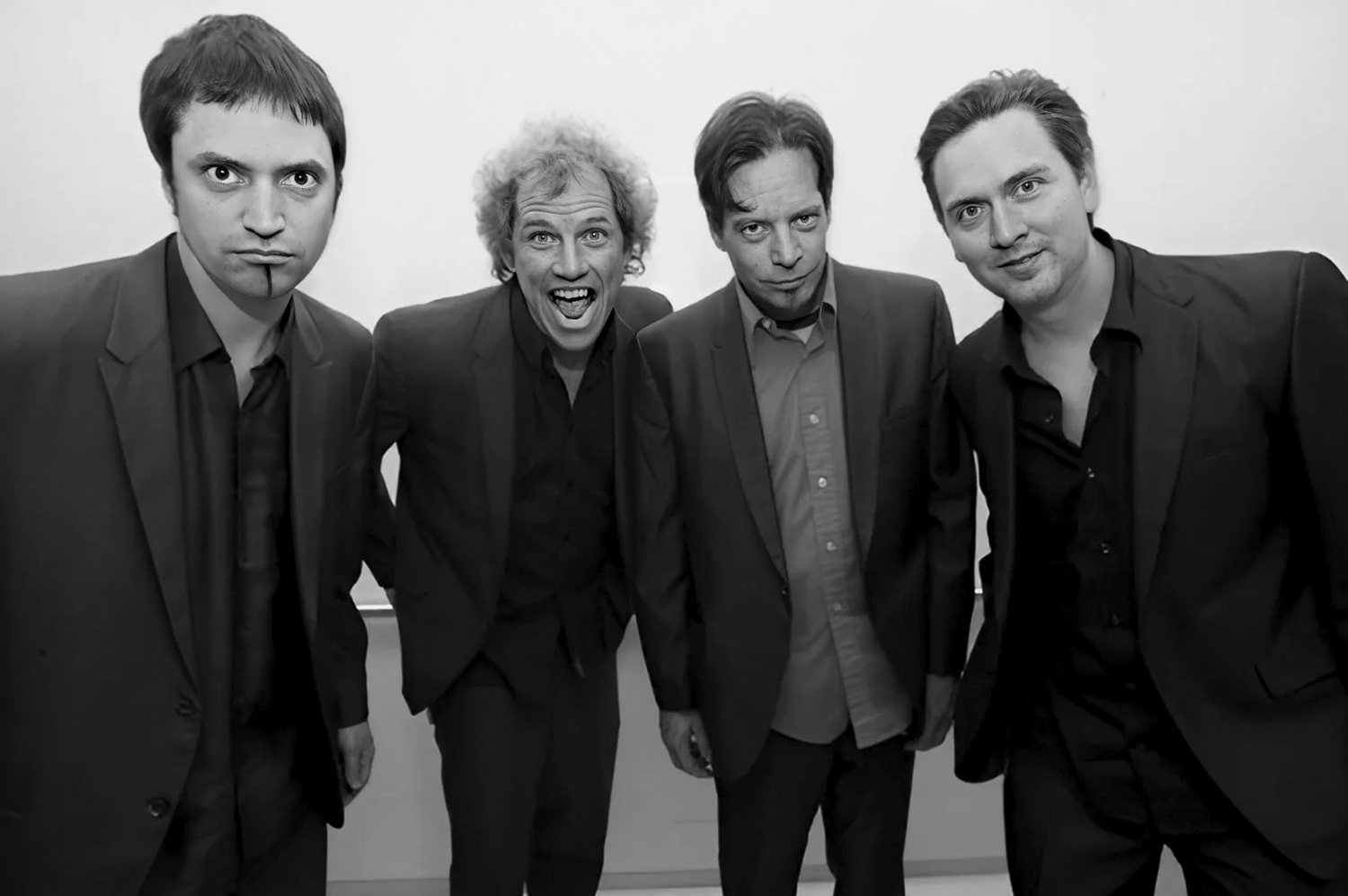 Critters Buggin, 2004: Skerik, Mike Dillon, Brad Houser, and Matt Chamberlain | Photo: Michael Didonna
Critters Buggin, 2004: Skerik, Mike Dillon, Brad Houser, and Matt Chamberlain | Photo: Michael Didonna
Your work with Critters Buggin is one of the most critical elements of your journey—not just the recordings you made with it, but the community that was created within and around it. How do you look back at what the group achieved?
It was super-fun and a great time. I met Matt Chamberlain in 1992. He had just moved to Seattle and wanted to jam with everyone who wanted to play. I had never played with anyone with that kind of experience. He had just come from working on Saturday Night Live as a drummer in that band. He had played with a lot of heavy people. It was really exciting for me. I wanted to be a full-time musician so badly, but at that time, I had day jobs. I was really hungry and wanted to play with people better than me. It was great to meet him.
Matt and I started going through a lot of people as we began working together. His friend Brad Houser moved to Seattle from Dallas, and we hit it off really well. Then John Bush came into it, who was the percussionist with Edie Brickell and The New Bohemians. The group just clicked. There were no limits. Any idea I had, those guys could play, including odd time signatures, metric modulation, and any tricky little compositional things. It was so easy for them—just effortless. I really needed writing collaborators and companions during that time, and they were great.
At the time, I wasn’t writing full pieces. I wouldn't say “Here are the bass, drum, and percussion parts.” Those guys were really helpful in putting up with all my stuff and taking the time to learn it and play it. They injected all of their great ideas into them to form the pieces. At the base of it all was improvisation and we loved that. We were listening to Nine Inch Nails, Mingus, Stravinsky, Captain Beefheart, and Peter Brötzmann. We’d sample Stravinsky, Beefheart, and Brötzmann, too. All of those things were influences on us. It was a great education.
Right now, we’re working on a new Critters Buggin album tentatively titled Sissy Moose. It’s made up of music from two radio shows from 1995 and 1996. The music is on 16-track 1” tapes that we had to get baked and transferred into digital. Our longtime engineer Mel Dettmer is working on that stuff and it’s crazy music. The album includes songs we’ve never released before. It’s coming out on Royal Potato Family. Also. the album Host will be rereleased on Loosegroove later this year on vinyl with expanded artwork.
Houser tragically passed away unexpectedly last year. What are your thoughts on his legacy?
He was a fearless improviser. He had grown up in Texas together with the New Bohemian guys, including John Bush, Kenny Withrow, and Brandon Aly. When Edie Brickell joined them, she was joining as an improviser herself, just making up lyrics on the spot, and that’s how they clicked.
It was great to meet Brad and have him in Seattle a while. He was someone who was constantly practicing all the time and wanting to play with everybody. He was always working on African music, with a focus on Congolese music with a great guitarist named Leif Totusek. We also got really into Moroccan music for a while and toured with Bachir Attar from Master Musicians of Jajouka.
We also had the band Black Frames together. We made one record with Earl Harvin called Solarallergy. It was a lot of mallet-based compositions in which we all had to play mallet percussion. Brad was always about constantly learning and listening.
He’d also read trippy books by people like Terence McKenna and Robert Anton Wilson just to look for fuel for this crazy music we were playing.
He was also really into saxophone. He played saxophone consistently all the time. Bass was a second instrument for him. He started out playing sax. It was so fun in The Dead Kenny Gs. We’d have breakdowns where he’d play baritone sax and I’d be on tenor.
Brad is really missed by the Austin, Texas music community because he was so supportive of it and played with everyone. A lot of singer-songwriters there needed a bass player and he played with a lot of them. And every drummer he worked with will tell you he was so solid and great to play with.
Brad’s intention, when playing the smallest gig with 20 people to large shows with 20,000 people, was to always be 100% there, as if it was the last gig on Earth. He had such a beautiful energy. Brad was a constantly creative force and a really seeking individual of philosophy and spiritual stuff.
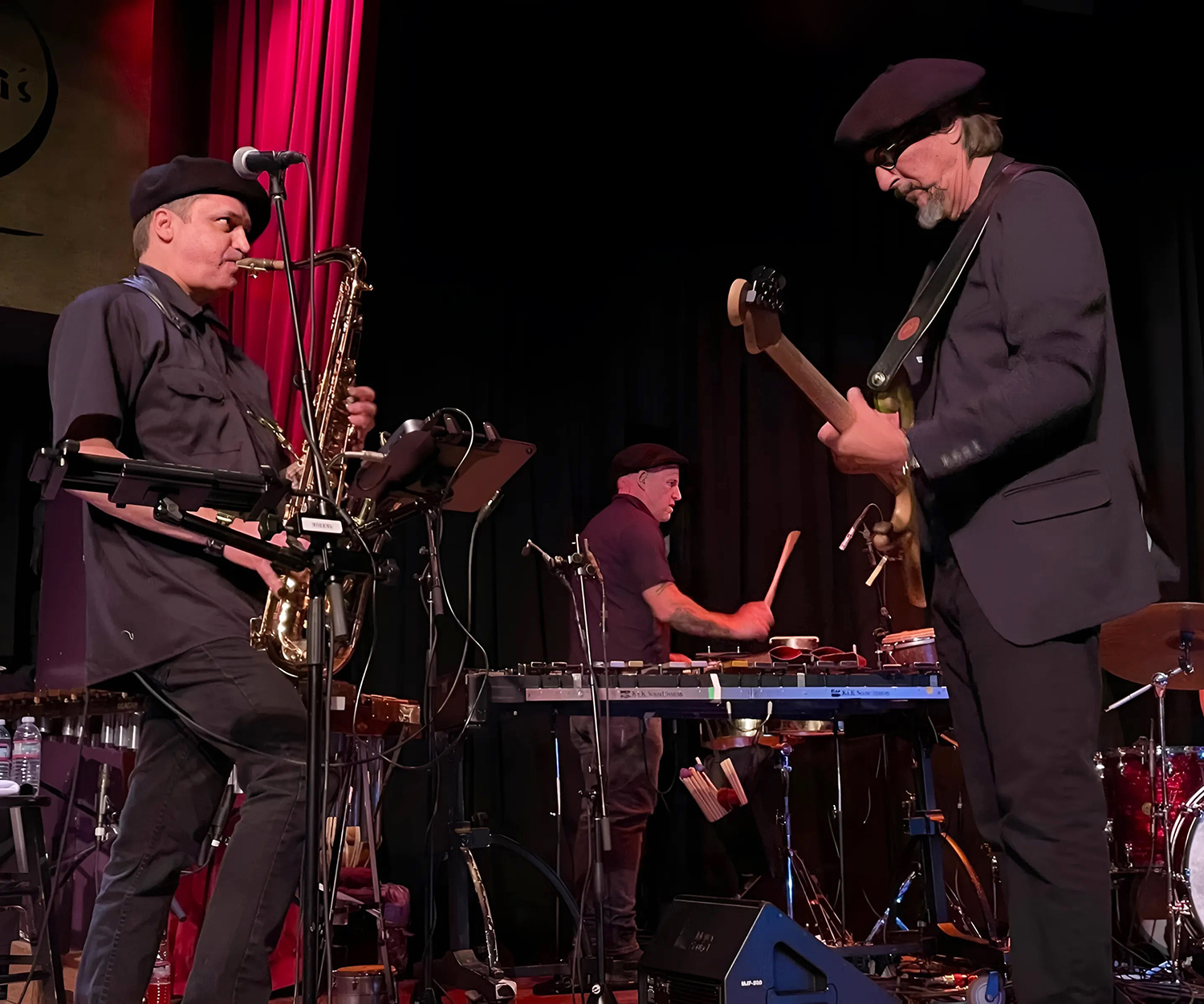 Les Claypool's Bastard Jazz at Yoshi's, Oakland, CA, 2022: Skerik, Mike Dillon, and Les Claypool | Photo: Anil Prasad
Les Claypool's Bastard Jazz at Yoshi's, Oakland, CA, 2022: Skerik, Mike Dillon, and Les Claypool | Photo: Anil Prasad
You’ve been part of Les Claypool’s Bastard Jazz band since its inception in 2017. Delve into the quartet's approach.
I’ve been playing with Les for 24 years. Mike Dillon and I are the constants in that band. We’ve had some different drummers. Stanton Moore did the last tour. We also once had Vinnie Colaiuta for two nights, which was insane. He just got behind the drums and crushed it. I understood why everyone from Herbie Hancock to Sting has hired him for years. You hear the word “telepathic” bounced around a lot, but with Vinnie, he knew exactly what Les was going to play every time and locked in.
The band’s music is all improvised. There are no songs. Like Wayne Shorter said, “Composition is improvisation, slowed down. And improvisation is composition sped up.”
I don’t think people really understand how much of a straight funk bass player Les is. He does all that weird stuff that people associate with him, but he’s equal part Isley Brothers. It’s such a unique combination. It’s hard for a lot of people to say that, especially when you have a bunch of white fans. Most people don’t associate Les with Black music. If you’re a fan of Rush, you’re probably not going to be listening for Isley Brothers influences. I’m glad Adam Deitch is now in the band to flesh out that side of things. Like Jay Lane, he’s a funk drummer and gets it. We don’t even have to think twice about that side of things.
So, Bastard Jazz is really interesting in how it brings that together with improvisation. I like it a lot. Sometimes, I have to be careful with how I experiment onstage. I once had three harmonizers going and I was building these crazy chords with lots of insane little clusters and minor seconds. And it became hard to listen to and inflicted a great deal of pain on people. [laughs] So, I have to be a bit chill on that. But the band is a challenge in a positive way. It’s a great exercise to improvise within certain limitations and without other limitations and make music happen.
You just recorded two new solo albums. What can people expect from them?
I made those in Brooklyn at Circular Ruin studios run by Randall Dunn. They feature Nate Wooley on trumpet, Ches Smith on drums and percussion, and Cyro Baptista on many different percussion instruments. The musicians were all overdubbed individually for each track. One of the albums will be an ambient record, mostly featuring me on looping saxophones. The other record features the guest musicians in a more rhythmic setting.
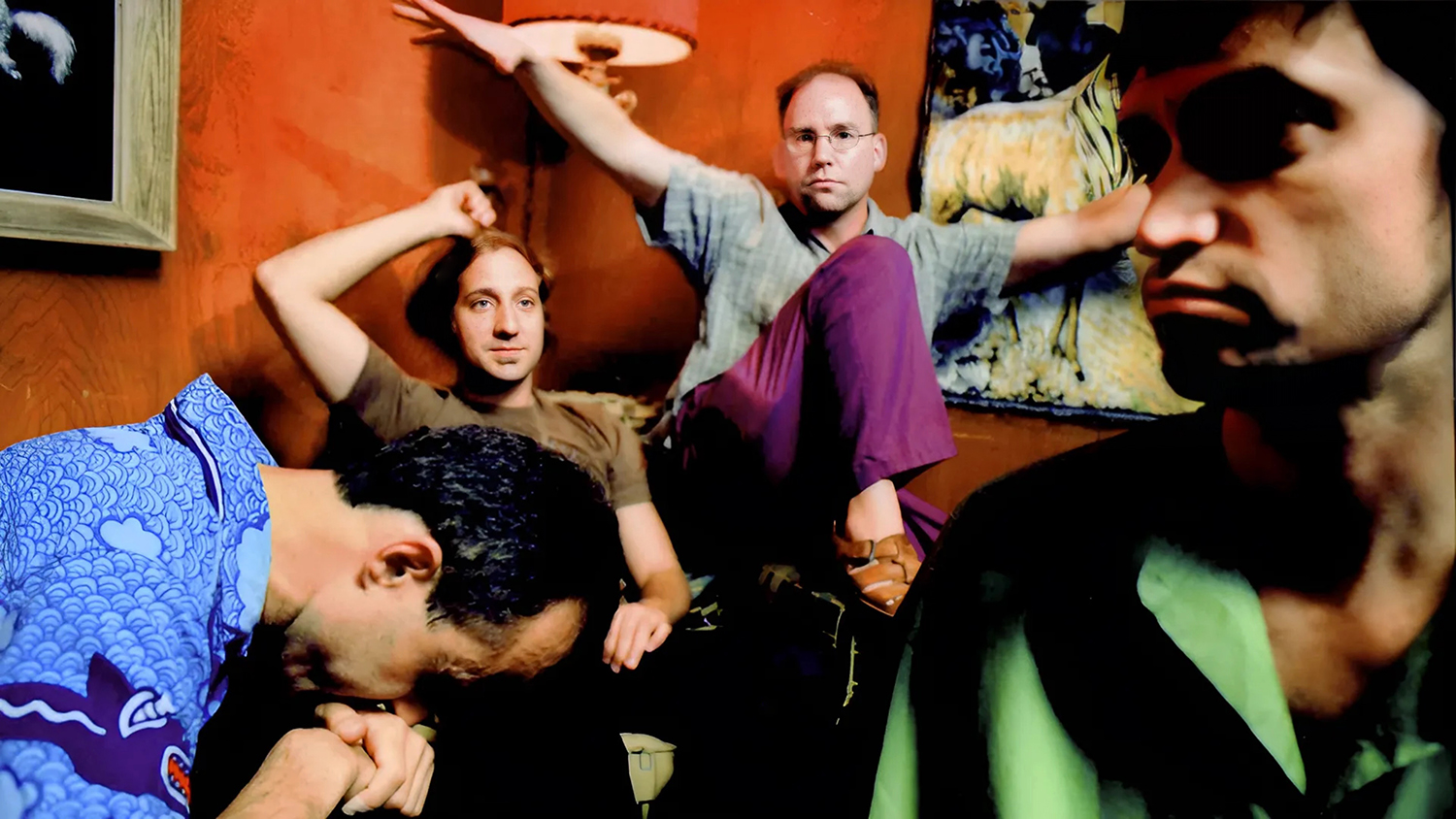 Ponga, 1999: Bobby Previte, Dave Palmer, Wayne Horvitz, and Skerik | Photo: Loosegroove Records
Ponga, 1999: Bobby Previte, Dave Palmer, Wayne Horvitz, and Skerik | Photo: Loosegroove Records
Ponga was a band that hit stratospheric musical heights during its core existence between 1997-2001. Reflect on its accomplishments.
I’m lucky to have worked with both Matt Chamberlain and Bobby Previte—two of the greatest improvising and composing drummers on the planet. It really provides meaning to what I’m trying to do and gives me guidance.
Ponga started as a trio, with Bobby, Wayne Horvitz, and me, and we’d tour in Europe under Wayne’s name or Bobby’s name. It was 100%-improvised all the time. Then we met Dave Palmer through the Critters Buggin guys—an incredible keyboardist. When we were a quartet, it was really fantastic.
When you’re improvising with real improvisers that have played with so many people and helped create the Downtown New York scene in the ‘70s and ‘80s, it’s really something amazing. I learned so much working with those guys. To this day, I still play with Wayne. We just played on Mike Clark’s recent record Kosen Rufu. We wrote four songs together for that release.
Ponga was a great band, but the financial reality of the world has changed so much since that band started. We used to be able to go to Europe, Japan, New York City, and the West Coast of the US. It was able to work out. All that is gone now. And I’m not just talking about fringe music or music that’s really outside. Let’s say Taylor Swift is at the core and then you radiate outwards. At the very outer ring of any formula you want to use is where bands like mine sit. We get all the scraps from whatever Swift has created. We’re on the outer, outer, outer rings and those have been shrinking the past 15 years. So, it’s really hard. The money just isn’t there anymore. So, we have to be creative as musicians and think of new ways to do it. So, that’s the challenge.
You played with Mike Clark in his Prescription Renewal band during the early 2000s. Describe that multigenerational experience.
I’m so thankful to Charlie Hunter for a lot of opportunities, including suggesting me to Mike for that band. Mike and I have been good friends ever since then. We’ve got that strong eighth-grade mentality within us along with the intellectual, philosophical, and spiritual stuff that comes along with getting older. But we just still fuck around like little kids. He’s so much fun to hang out with. We just laugh all the time. I forget he’s a famous drummer all the time.
We’ve had some great musical times. Getting to tour with Fred Wesley for a couple of years in Mike’s band was something. Those were moments I’ll never forget until I die. It was just such an honor and incredible feeling to work with him. His swing, depth, tone, timbre, and intention were so great. Also, just the realness of all those guys in that band was so important. I’m grateful to Mike for having me in it.
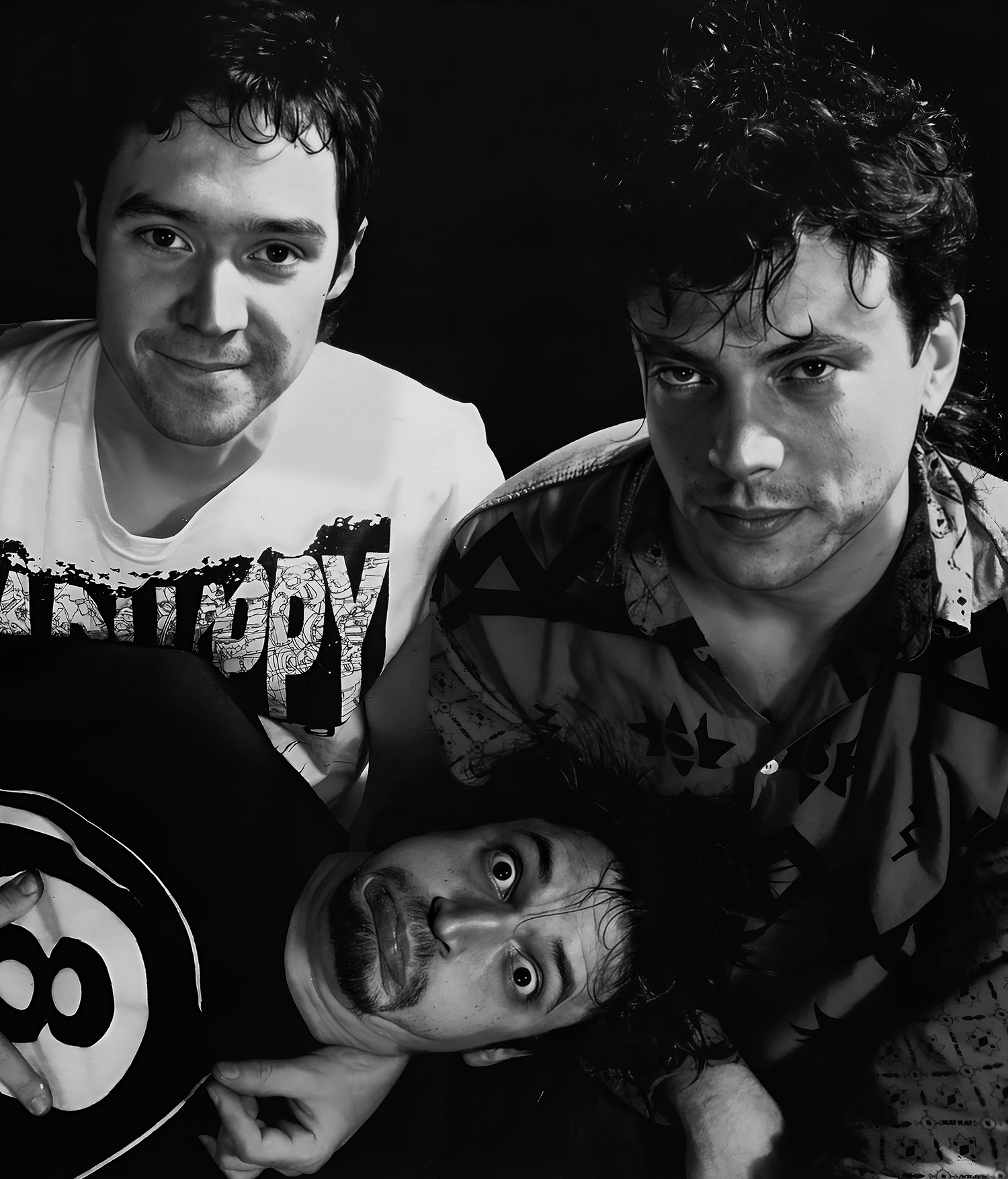 Sadhappy, 1992: Evan Schiller, Paul Hinklin, and Skerik | Photo: Alisson Braun
Sadhappy, 1992: Evan Schiller, Paul Hinklin, and Skerik | Photo: Alisson Braun
During the early ‘90s, you were part of the punk jazz trio Sadhappy. The band’s drummer Evan Schiller is working on a remix of the band’s classic 1992 album Depth Charge. What are your thoughts about that LP and your time with the group?
I’m still good friends with Evan. He has an amazing studio and he’s helped a lot of us out with mixing and production. He’s very generous with all of us.
Revisiting Depth Charge is a great idea. It was so much fun to make. I didn’t really know what was going on then. Evan and the bassist Paul Hinklin were a duo and doing fine. I’d play with them on a gig-by-gig basis. It was like, “Oh, you guys want me to come down?” And then one day Paul, who was one of the greatest bass players of all time, says, “I guess you’re in the band now.”
When I say Paul was that great, I mean it. I saw him make Manny’s Music in New York City on a weekend go completely quiet when he played a Bach cello concerto on four-string bass. His technical ability was astounding. He also had the passion and fire of rock.
Sadhappy did all these crazy hybrid fusions. My job was to make Paul sound good and augment what they did as a duo. I wrote a couple of lines within a couple of songs, but it was mostly Paul’s writing and direction. Evan and I were just trying to hang on and back him up. It was so powerful to work with him. Every gig I did with Sadhappy was fire. So powerful.
Paul really wanted to have that rock star thing happen. So many bands were blowing up around us back then, including Soundgarden, Nirvana, Pearl Jam, and Alice in Chains. He wanted to be a part of that. He auditioned with Soundgarden once, but they told him he was “too good.” That didn’t sit well with him.
Personally, I couldn’t care less about all that shit. That’s not why I play music. It’s never been about meeting girls or getting famous for me. That’s some of the most stupid shit I’ve ever heard in my life. I’ll never understand it. I always argued with Paul about that, but that’s what he wanted. So, he started playing with some other band and it didn’t work out. Unfortunately, he had some serious health issues and hasn’t been able to play since.
Describe how you’re making a financial go of things, given the difficulties musicians are experiencing when it comes to monetizing recordings and with show guarantees shrinking.
Twenty-five years ago, a friend of mine said, “If you want to make a living playing music, get into real estate.” I was very lucky. I bought a house in Seattle in 2010 that was inexpensive and it’s now worth many times that. I put a lot of time and energy into building that house, including a studio in the back, which was originally a two-car garage. I can even live in the studio and rent the house if I have to. So, that’s really helped me.
I like building things and I was kind of like a general contractor once. I always use great craftspeople who are carpenters, plumbers, and HVAC people. I don’t do a lot of it myself, but I organize everything. And the best craftspeople in Seattle are musicians. It’s a whole community. So, this has enabled me to really fully commit to playing unpopular music. [laughs]
When it comes to making money through the recordings, it’s still surprising we lost the battle with Spotify. It’s sad driving in a city like Los Angeles and seeing a huge billboard that has Kamasi Washington promoting Spotify. It’s like, “Why is this happening?” Yeah, sure, as a listener, streaming is great because you have access to all this music. It’s not like when I was a kid, and we’d get $2 and $3 used records at Cellophane Square Records in Seattle. We couldn’t afford new records, but we’d get a bunch of used stuff every week. Now, we have access to so much music, but the price the musicians are paying for that convenience is unbelievable.
SAG-AFTRA successfully settled with the video streamers and studios over residuals after going on a six-month strike in 2023. Why are musicians incapable of organizing in the same way to protect their livelihoods?
Yeah, SAG-AFTRA was not fucking around. If musicians had that kind of representation, we would have a completely different world. There’s the American Federation of Musicians union, run by friends of mine in New York who have been very heavily involved in educating people about what’s going on. Marc Ribot has been fighting recording industry inequity since the ‘90s. He’s very outspoken about the economic implications of being a musician.
The problem with so many of us musicians is we’re just so self-centered, selfish, and stupid, that we don’t want to deal with what’s going on. In my case, I just want to play. But yeah, we should all be organized and be in a union. We should be walking out on these services.
There have been individual isolated actions like what Prince and Taylor Swift have done. Those have been great. Both of them re-recorded their own music so they could own the rights. Prince would also game the system by building in the purchase of an album into the ticket price for his sold-out tours. “You came to the show. You’re going to buy a CD.” And then the CD goes to the top of the charts. He was such an amazing person when it came to being creative as a musician and businessperson. We need more people like that with ideas that go beyond music into the business world.
I wish there were more people with political savvy on the side of musicians. It takes hard work, time, and study to do it, and man, with everything else it takes to be a musician, it’s hard to do that. But imagine if Bruce Springsteen and Swift got together at a big press conference and said, “Look, we encourage all of you musicians to join a new union that represents your rights.” They could call it something new that makes people excited, but it could just be the same old union. But here’s the thing, if we all joined it, stuck together, and pursued collective bargaining, the whole system would change.
Do you have a manifesto for your uncompromising musical worldview?
It’s to follow whatever sounds good and feels good. So many people interview me and are constantly throwing genres at me like “jazz.” Obviously, these people have never read anything by Yusef Lateef and his neologism for jazz called autophysiopsychic which means “music from one’s physical, mental and spiritual self.” He didn’t want to use these simplistic and overly-general qualifiers that are what genre names are all about. It’s a good thing to keep in mind. I like the John Medeski quote that goes “The hardening of categories leads to art disease.” So, I’m trying to be as honest as possible and play the best music with the best people I can find. That’s what it’s about.